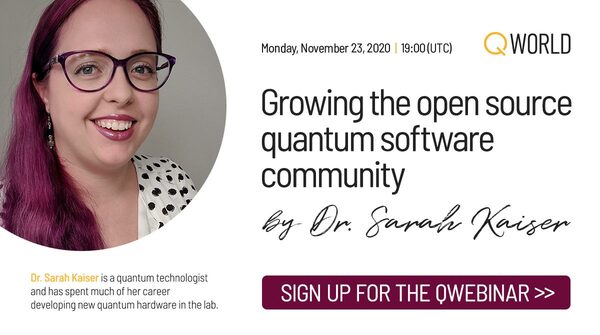Source:
Article web page:
We invite you to the next QWorld seminar. During this meeting, Sarah Kaiser will talk about the open-source quantum software community.
From the speaker: When we are developing new technology, it is our communities that develop and drive us further than any individual effort could. We have lots of examples of how communities have helped shape other technologies and in particular open source software projects and people that now underpin much of our current software ecosystems. I want to share with you my journey from academia working as an open-source quantum developer at the Unitary Fund, what I have learned about the role that open source software has to play in developing quantum technologies, and how you can help grow our quantum community.
About the event:
Date: 19:00 (CEST), Monday, November 23, 2020.
Registration form: https://forms.gle/XmD8WvAoKpgtivXs7
Moderators: Özlem Salehi (QWorld&QTurkey) and Maksims Dimitrijevs (QWorld&QLatvia)
Organizers: Abuzer Yakaryılmaz (QWorld) and Agnieszka Wolska (QWorld)
About Sarah: Dr Sarah Kaiser is a quantum technologist and has spent much of her career developing new quantum hardware in the lab. From satellites to hacking quantum cryptography hardware, communicating what is so exciting about quantum is her passion and she loves building new demos and tools to help enable the quantum open source community to grow. When not at the keyboard she loves kayaking, laser cutting everything (safe), and writing books about engineering for kids and adults alike.
About QWorld: QWorld is a global network of individuals, groups, and communities collaborating on education and implementation of quantum technologies and research activities. Our main aim is to have open access and public global ecosystem for quantum technologies and quantum software by the year 2025 so that each interested hardworking individual, group, institute, or region can be easily part of the ecosystem.

